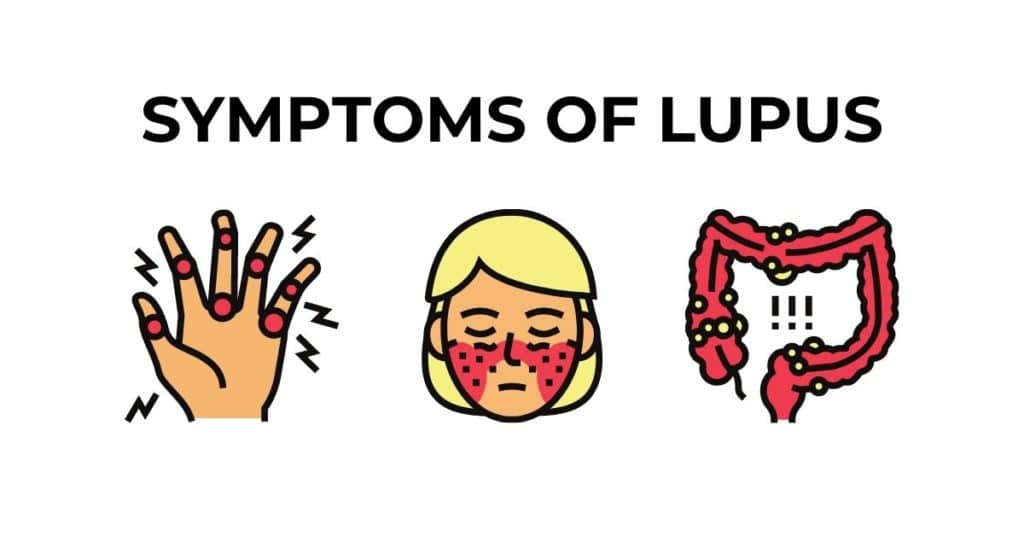Diet and Nutrition for Lupus
Lupus, an autoimmune condition, is a chronic disease leading to inflammation and pain throughout the entire body. We hear the word inflammation thrown out a lot today when discussing health and disease. In the case of autoimmune diseases, inflammation occurs when the body begins to attack healthy tissues instead of protecting the tissues. For those with lupus, this results in swelling, pain and/or dysfunction of the kidneys, heart, lungs, joints and skin. Additional symptoms include fatigue, hair loss, and cognitive dysfunction. Lupus is not easy to diagnose or treat, but diet and nutrition can definitely help make it more manageable.

Lupus Diagnosis
There are several forms of lupus but the most common is systemic lupus erythematosus (SLE). According to the National Resource Center on Lupus (1), lupus is most prevalent among women ages 15-44 and individuals who have a family member with lupus or another autoimmune condition. The Lupus Foundation of America (2) reports 1.5 million Americans and a minimum of 5 million people worldwide are presently diagnosed with lupus. Lupus is challenging to diagnose because the symptoms may come and go and the physical manifestations can mimic other disorders. Sawah et al reported 63% of lupus sufferers note inaccurate initial diagnoses. Similar to other autoimmune diseases, it takes a long time to be accurately diagnosed with an average of 6 years from first symptom to diagnosis. (3) If you have lupus, you might be an example of these statistics.
Along with inaccurate diagnosis and long-term diagnosis periods, most patients are never informed about the role of diet and nutrition for lupus management. This is largely due to the advancement of medication and the limited nutrition knowledge of health practitioners. Nonprofit lupus organizations may even downplay the role of diet in lupus management. If you take a deeper dive into research studies, you will find that food may impact SLE management. To be clear, there is no evidence that nutrition can cure an autoimmune disease. There is no medication that can cure an autoimmune disease either. But wouldn’t you like to know if simple dietary choices could help reduce pain or diminish additional complications? For your ease of reference, I have included several recent studies that review just that. Let’s talk about diet and its impact on SLE.

Studies on Diet and Nutrition’s Impact on Lupus
In 2021, a group of scholars published a study reviewing the role of the Mediterranean diet on SLE activity, progression of disease, and cardiovascular risk in this population. They studied 280 patients with SLE and studied their diets and various lab values. The lab values included inflammatory markers as well as cardiovascular risk factors like weight, blood pressure, cholesterol and blood sugar levels. Over the course of the study, Pocovi-Gerardino et al noted a significant inverse relationship between the Mediterranean diet and disease activity, disease progression and cardiovascular related lab values. Simply said, those participants that adhered to the diet, showed significant improvement in all three areas. The increase in consumption of Mediterranean diet foods such as olive oil, vegetables, fish and fruits and the decrease in red meat and sugars also showed a decrease in SLE activity and comorbidities. (4)
Food should be considered the foundation of every treatment plan. It is often the most affordable, pleasurable, and safest of interventions.
Could low calorie, low glycemic foods be the answer to reduced inflammation and improved quality of life for those with SLE? According to a review of literature by Imoto et al, the data supporting such a nutrition intervention is lacking. (6) For now, the focus seems to be on healthy fats and less about sugar. In fact, a 2021 study reviewed data from the Black Women’s Health Study with the goal of assessing diet and risk of SLE. This study reviewed intake of carbohydrates, proteins, fats, and fiber. The study revealed that a carbohydrate rich and low fat diet was associated with a higher risk of SLE in African American women. (7)

Do you see a trend evolving in just this limited amount of research? Let’s take a closer look at fats and how they could contribute to SLE development and management. As discussed earlier, individuals with SLE have a higher risk of cardiovascular disease and atherosclerosis. Statistics indicate 36% of patients at time of diagnosis have elevated cholesterol. (8) Additional gene expression studies indicate an interaction between lipid metabolism and autoimmune conditions. So, how can diet and nutrition positively impact lipid metabolism thus improving the inflammatory state of autoimmune disease? It’s all about the type of fat you choose to eat.
We know that polyunsaturated fats positively impact lipid metabolism. A couple of animal studies focus on the role of eicosapentaenoic acid (EPA), a type of omega 3 fat, supplementation and its impact on SLE. These studies indicated EPA supplementation impacts severity of disease. (9,10) This study revealed a role for EPA in the care of patients with SLE. It showed that EPA has similar effects as approved pharmaceutical drugs. The benefit is that EPA poses lower risk of infection and other complications as compared to its pharmaceutical counterparts. Other studies note EPA reduces SLE activity and lengthens remission. (9) EPA may also help reduce the side effects of pharmaceutical interventions leading to a potential mixed modality therapy for SLE and other autoimmune conditions including multiple sclerosis and rheumatoid arthritis. (11)
“Diet is feasibly one of the most important factors since it is linked directly to epigenetic alterations and these epigenetic changes may augment or diminish the risk of systemic lupus erythematosus.”
–Montoya et al
Montoya et al (5) notes the recent connection between the pathophysiology of autoimmune conditions and epigenetic factors. Epigenetics consists of changes in gene expression and function due to environmental exposures including infection, chemicals and nutrition. In this same review, Montoya et al highlights that “diet is feasibly one of the most important factors since it is linked directly to epigenetic alterations and these epigenetic changes may augment or diminish the risk of systemic lupus erythematosus.” (5) The web of autoimmunity is complex and may result from a storm of epigenetics, genetics and environment. While we await additional research for the prevention and cure of such conditions, the quality of life of the individual must be addressed. SLE and its autoimmune sisters are chronic disease states. The diagnosis of a chronic disease does not mandate a life of chronic pain. Simple lifestyle changes like eating proper nutrition for Lupus might be enough to help each person manage their condition with minimal side effects compared to other treatment modalities.

In Conclusion on the Connection Between Lupus and Nutrition
Once again, food should be considered the foundation of every treatment plan. It is often the most affordable, pleasurable, and safest of interventions. Diet may not be able to fix all health problems, but it can definitely play an integral role in healthcare. The most important aspect of medicine is to nurture the patient and improve quality of life. Food is the first step to living well with autoimmune disease.
If you’re interested in personalized nutrition to help you manage your autoimmune disease, view my services or book a free discovery call.
Sources
- https://www.lupus.org/resources/what-is-lupus
- https://www.lupus.org/resources/lupus-facts-and-statistics
- https://ard.bmj.com/content/74/Suppl_2/812.3
- https://pubmed.ncbi.nlm.nih.gov/32594173/
- https://pubmed.ncbi.nlm.nih.gov/34392862/
- https://pubmed.ncbi.nlm.nih.gov/34742350/
- https://pubmed.ncbi.nlm.nih.gov/34225359/
- https://pubmed.ncbi.nlm.nih.gov/17728367/
- https://pubmed.ncbi.nlm.nih.gov/31611873/
- https://pubmed.ncbi.nlm.nih.gov/23918873/
- https://www.ncbi.nlm.nih.gov/pmc/articles/PMC8240640

